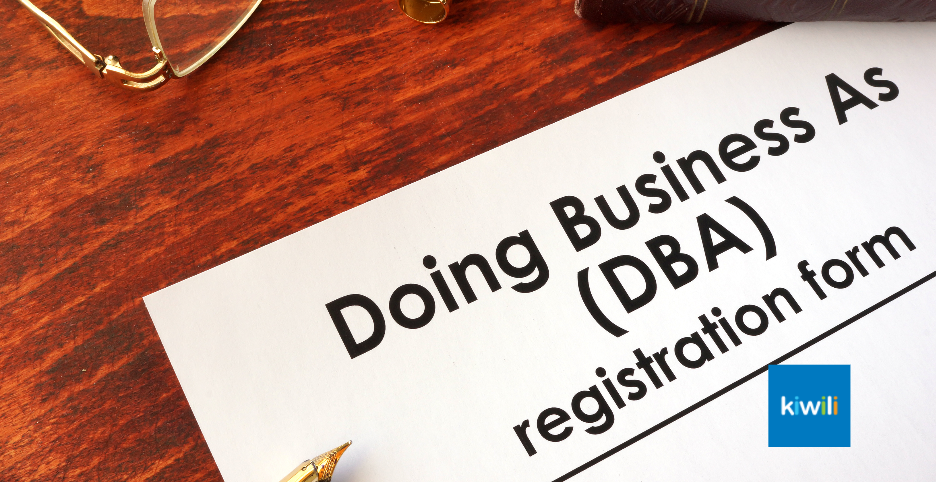If you’re in the process of setting up your business, you must have heard of the DBA aka Doing Business As. But what is it exactly? And how can it be helpful in your business? No more wondering, Kiwili is here with all the answers!
What does DBA stand for?
DBA literally stands for doing business as and refers to your fictitious or assumed business name.
When is a DBA required?
A doing business as is required when the name a company operates under is different from its legally registered name. Many people choose to change their names legally or go by their middle name or a nickname. It’s not a crime to go by something other than your full name listed on your passport, same goes in the business world.
Why are DBAs necessary?
This process is known as filing a DBA. DBAs helps protect consumers and the general public by disclosing the full names of business owners. This means dishonest business owners can’t avoid debts or disgruntled customers by shutting up shop and reopening under a new name elsewhere.
Declaring a DBA
When someone files a DBA in your area, it is often published in local newspapers, for example the classified ads. This helps the community become familiar with business owners in the area and which businesses they are responsible for.
Small Businesses vs. Corporations and Limited Liability Companies
DBAs can be required for small businesses and large corporations alike, ranging from freelancers to LLCs.
Sole Proprietors
If you are a sole trader, a DBA is required if your business is called anything other than your own name.
This is pretty commonplace amongst sole traders, freelancers, and small businesses, after all, the right business name can work wonders for a business in terms of word of mouth and reputation.
Consider the difference between John Smith Photography and Happy Snaps Photography, Snap Happy Photography, or Happy Days Photography Services.
The various connotations and indications about your service offering are invaluable for a small business trying to get their name out there.
You won’t need a DBA if your business name is a direct combination of your name and a description of your activity. eg. John Smith Family Photography Studios.
JS Creative Studios and Smith Creative would however require a DBA as the full name of the legal owner is not included.
Corporations
A corporation is a legal entity that is separate from the business owner, meaning they are absolved of personal liability associated with the business.
LLCs
A LLC combines sole proprietorship and a corporation. In an LLC the owner isn’t responsible for liabilities either, but the company will not continue to operate in the event of the owner’s death, and will also cease operations if the owner is declared bankrupt.
If you have already registered your corporation or LLC this is your registered business name and no DBA is required.
If you change your business name and operate under something different to what is listed on your corporation/LLC paperwork a DBA will then be required.
A DBA is still required even if you only make a minor change to the original name registered.
A DBA is also required to open a second business under the same corporation or LLC.
Advantages of Filing A DBA
Don’t be put off by the paperwork, there are lots of great reasons to register a DBA. DBAs are the simplest and cheapest way to register a business name without having to form a corporation or LLC.
Using DBAs, you can operate multiple businesses under the same corporation/LLC. This allows you to diversify your business and service offering over time and keeps all paperwork to a minimum.
If you don’t file DBAs, there may be holes in your paperwork that won’t hold up in court in the event of any conflicts, and you may lose legal protections for your company if you are not compliant.
Starting a business under your own name without using a DBA might seem straightforward but most people desire some privacy and a degree of separation between themselves and their work. A DBA means your business name will be used on public record as opposed to your personal name.
Lots of banks require a DBA in order to open a business bank account, keeping a copy of your DBA on file as proof the business name has been registered.
A DBA allows you to get creative with your business name and really capture the imagination of your customers.
Using DBAs you can have as many business names as you like under one company umbrella. This means you can create separate websites and social media pages for different products and services using market segmentation to target your customers and boost your online business activity and sales.
By declaring your business name to the world, you can prevent or at least discourage other business from registering under the same name, check with your local authorities what protection a DBA offers in your state.
If you’re still not sure, you can seek legal advice to help you decide if a DBA is right for you and your business.
Renewing Your DBA
Don’t forget to check how long your DBA lasts, in some cases DBAs need to be renewed every five years or less. You don’t want any gaps in your paperwork causing problems further down the line.
Keeping Your DBA Updated
Be sure to keep your DBA up to date with any changes to your business, whether you incorporate or become an LLC, relocate or open new offices, or appoint new senior members of staff. You may need to revise your DBA and file an amendment, or register a new DBA entirely.
DBAs Are A Legal Requirement
If you are thinking of burying your head in the sand and using a business name different from your legal name without registering a DBA, please think twice. It is illegal to operate under an assumed business name or fictitious business name with no DBA. You can’t start using your DBA until you receive certification.
The right business name can play an important role in your business strategy, helping you branch out and reach new customers.
Check the links below for more information on registering a business name in your country:
Registering a business name in Canada
Registering an enterprise in Québec
Registering a business name in the US
Setting up a business in the UK
If you’re in the process of setting up your business, you might be interested in our latest blog post, 7 Traits of a Good Entrepreneur
And good luck, from the team here at Kiwili!
Kiwili is an all-in-one business management software. It is at the same time an easy invoicing software, an accounting software, a CRM, a convenient project management tool and a time tracking software. Everything you need to manage your business like a pro!

